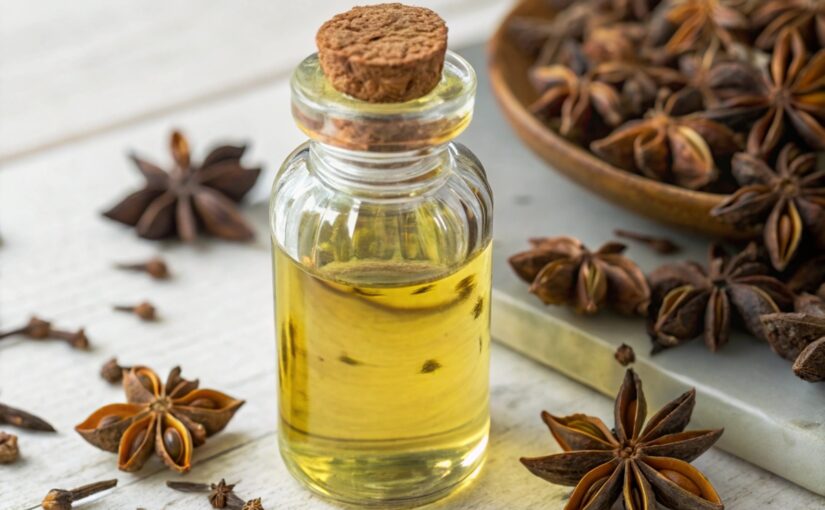Anise essential oil, extracted from the seeds of Pimpinella anisum, is distinguished by its sweet, enticing aroma reminiscent of licorice with warm, spicy, and herbaceous top notes. This oil traces its roots to the eastern Mediterranean and Southwest Asia yet is now cultivated in many parts of the world where it continues to enrich both culinary and wellness traditions. The essential oil is obtained by steam distillation, concentrating the unique chemistry of the plant into a potent, aromatic liquid with an array of health-supporting benefits.
The primary component of anise essential oil is anethole, a compound not only responsible for the characteristic scent of licorice but also for many of the oil’s therapeutic actions. For centuries, anise has played a significant part in herbal medicine, particularly in regions such as India, Turkey, and the Middle East. Foods and beverages flavored with aniseed are staples at tables and in marketplaces, but the essential oil’s contributions extend far beyond taste. Practitioners of traditional medicine have relied on anise for its ability to soothe digestion, calm respiratory discomfort, and quiet a restless mind, making it a valuable ally in natural wellness routines.
Anise essential oil is as versatile as it is aromatic, addressing a broad spectrum of health needs. Its analgesic properties help ease muscle pain, arthritis, and rheumatism, offering relief to those affected by chronic discomfort. As an anti-anxiety and sedative agent, anise can help calm episodes of anxiety, panic, hysteria, and hyperactivity. When used before sleep, it may ease insomnia and encourage a state of restful relaxation. The oil’s antispasmodic qualities make it effective for relieving cramps, convulsions, and spasms of the muscles, including uncomfortable digestive and menstrual cramps.
On the skin, anise essential oil exhibits antiseptic action, supporting the healing of minor wounds, soothing insect bites, helping eczema, and even providing relief from sunburn. Its calming and restoring qualities are not limited to the physical body; regular use also gently relieves emotional tension. Those who struggle with anxiety, stress, and emotional overwhelm may find anise oil’s grounding aroma helps restore tranquility and clarity.
One of the most appreciated properties of anise is its value as a digestive aid. When discomfort strikes, the oil can help ease symptoms like nausea, bloating, vomiting, and general digestive upset. Its gentle diuretic effect supports the reduction of excess fluid retention and promotes natural detoxification. When used as an expectorant, anise essential oil assists the lungs in clearing out mucus and congestion, making it a classic household remedy for asthma, bronchitis, and persistent coughs. Additionally, the warm, sweet aroma of anise helps repel insects when diffused in living spaces or added to natural sprays, making it practical for holistic home care.
Aromatherapy offers several accessible ways to utilize anise essential oil for both body and mind. Diffusing two to three drops in water helps ease nausea, emotional stress, or airway congestion. Topically, the oil should always be diluted, one to two drops blended with a carrier like coconut or almond oil is sufficient before applying to the abdomen for digestive relief, to sore muscles, or directly to minor skin wounds or bug bites. Direct inhalation from a tissue is ideal for calming a cough, soothing asthma symptoms, or alleviating sudden feelings of anxiety. For a deeply relaxing bath, five to ten drops of diluted oil mixed into warm water can unwind tired muscles and set the scene for restful sleep.
The emotional and energetic effects of anise essential oil are profound. Its sweet fragrance quickly transforms an environment, dissipating restlessness and supporting tranquility. In moments of agitation or mental noise, anise oil’s aroma can act as an anchor, settling hyperactivity and restoring focus. For individuals practicing meditation or seeking calm at bedtime, the oil’s gentle grounding is a valuable addition to relaxation rituals.
Anise essential oil also blends well with other aromatic oils to create synergistic effects. Its companions include cedarwood, dill, ginger, mandarin, pine, rose, and sweet orange, each providing a unique layer of complexity to blends for inhalation or diffusion. Should anise not be available, fennel and ginger often serve as suitable substitutes, each with related fragrant and therapeutic characteristics.
Despite its many benefits, responsible use is important. Anise essential oil should always be diluted before any application to the skin. A small patch test is recommended for first-time users to check for any sensitivity. It is not recommended for use by pregnant or nursing women due to possible hormonal effects, nor for individuals diagnosed with estrogen-dependent cancers, as anethole can influence estrogen levels in the body. The oil should also be avoided for children under six. Due to potential carcinogenic effects at high doses, anise oil should only be used sparingly, and accidental contact with the eyes should be avoided. Internal consumption should never occur unless under the guidance of a healthcare professional.
Anise essential oil, with its warm, sweet, licorice-like fragrance, stands as a potent and time-honored remedy bridging culinary traditions and holistic healing. Whether gently easing digestion, calming anxious thoughts, or supporting clear breathing, anise offers reliable support for both physical and emotional well-being, provided it is respected for its potent natural force and used mindfully within established safety guidelines.
If your heart finds joy and inspiration here, consider supporting the work that keeps these stories blooming. Your donation, no matter the size, helps sustain authentic research, creative writing, and the spirit of sharing that connects us all.
